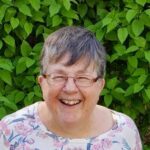40 years of our Usher service: The difference it’s made
This September, we’re celebrating the 40th anniversary of the Sense Usher service! Usher syndrome is a genetic condition, the symptoms include hearing and sight loss, which can be progressive. Marylin Kilsby, who was an essential part of operations from very early on, joins us to reflect on those decades and the support Sense made available to people with Usher.
The Usher service story really begins with a woman called Mary Guest. Mary was a teacher of the Deaf back in the 1970s. She realised that there was some common link between children who were Deaf and who were also developing sight problems. She started learning more about this group of people and connected the dots to Usher syndrome.
I was also as a teacher of the Deaf a few years after Mary. I’d met some students with Usher syndrome, but we had no written information about the condition at that time.
Rodney Clark, then Sense CEO, heard that Mary was gathering knowledge about Usher and sort of headhunted her. He realised that what she was talking about was a form of deafblindness, and that Sense could support Mary to reach more people. That was when the Sense Usher service began, 40 years ago.
We wanted to stop people living in fear
It all felt quite urgent. At that time, people could go their whole lives without understanding that what was happening to them was Usher. They didn’t know how to cope with the dual sensory loss and, really sadly, in those early days we did encounter suicides.
It was important to let people know that, actually, if you have Usher, you’re not going to wake up one morning and find that you’re blind. People were always so relieved to learn that; some had indeed been living in fear and without access to information.
At first, Mary’s main goal with the service was to raise awareness and help people to access advice. It was called the ‘Usher Information and Education Project’ and it was more for professionals, like other teachers, doctors and social workers.
It was all pre-internet, so we’d send out information sheets for people to collate at home. It was a great way to pass on all the new things we were learning, especially when we developed the second branch of the service and started having more contact with people who had Usher.
I’d written to Mary asking for a job, explaining that I wanted to better understand Usher syndrome and how to support people who were living with it. When I joined, I started working with Usher individuals and their families, with Mary as my manager. People would tell us things about their lived experience, and we’d be able to get the word out to our network of professionals quite fast.
Later, Mary started concentrating on carrying out important research into Usher syndrome, and I became the manager of the services aspect of the work.
Sense research gave people vital knowledge
Mary and I continued to expand and evolve the service offering. We connected with emerging Usher specialists from across the world. We created networks and mentoring programmes for people to connect and learn from each other directly.
There’s great value in the mentor relationships. Sense still works to match-up people with similar experiences to support each other. Natalie has spoken about this before. She had a late diagnosis for Usher type 2, where hearing and vision decrease more gradually; Sense asked if she’d be happy to talk to another woman who was going through the same thing. It’s wonderful for people to have that validation and understanding.
Not many people know that it was our research that helped to establish the different types of Usher syndrome (1, 2 and 3) and help tailor support accordingly.
People with Usher type 3 are born with some hearing loss, and that can deteriorate more quickly compared to people with Usher type 2, whose hearing loss may be stable or may worsen over time. Those with either type 2 or 3 tend to struggle to find a sense of community in Deaf groups and organisations, as they’re considered ‘head of hearing’. Of course, that means that many of them don’t feel connected to hearing communities either. They’re struggling on their own.
People now might not realise how much research Sense has done over the years. The research into genetics was incredibly useful for people with Usher, it’s something that people ask about – especially those planning families. They want to know if their child will have Usher syndrome. I think you can’t underestimate how important that genetics knowledge is. Mary really understood the difference our support could make.
In 2010, Mary was made an MBE. Without Mary’s pioneering work, our Usher service and the fruits of Mary’s research might not have existed.

